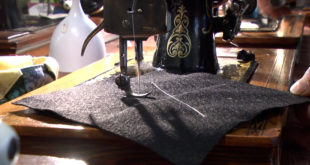Several Finnish-American researchers have devoted their academic careers to the phenomenon known as “Karelian Fever.” Many families across the Copper Country and beyond have ancestors who died as a result of that dark chapter in Finnish-American history.
Thousands of Finnish-Americans and Finnish-Canadians left North America, which was stricken by the Great Depression in the 1920s and 1930s to forge a new life in far northwestern Russia. Some simply sought adventure. Others were homesick and thought that Karelia would bring them closer to Finland. Many, though, were committed political activists who were convinced that they could live out their socialist ideals of fair wages, good healthcare and free education only in the Soviet Union.
This era in Finnish-America history is the setting for the April 2019 showing of the Finnish American Heritage Center’s Nordic Film Series. The 2017 drama “Ikitie” (The Eternal Road) will show at 2 and 6 p.m. on Thursday, April 11 at the Heritage Center. This film, which won six Jussi Awards, including Best Picture, is the conclusion of the 2018-19 season, and is a feature that is sure to resonate with many Copper Country residents.
At that time, communities across the Copper Country had been recently settled by Finnish immigrants who in short order became pegged as activists. One of these activists was Oscar Corgan of Hancock, who was a leading proponent of American Finns moving to Russia to begin a new life, to escape the back-breaking labor and low wages of America. Corgan — whose daughter Mayme (Sevander) became known internationally as a researcher of Karelian Fever and its horrific results — traveled through all the Finnish-settled communities in America with his recruiting pitch, looking to find workers to go to the Soviet Union to help build a utopian socialist society. Finns from nearly every community in Upper Michigan — Bruce Crossing, Mass City, Toivola, and many others — left to be part of this movement.
Many of these same Finns had come to America for greater opportunities, but found that American labor conditions could be rather brutal. What started as a dream of a better life quickly transformed into a gruesome story of Finns building socialism with their own hands with the trust of a Russian society that would eventually consider them enemies and seek to destroy them. Many Finnish immigrants to Karelia met an untimely and often savage demise. Those who were able to return were hesitant to talk about what they endured.
Corgan, as one example, was warned shortly after he and his family settled in Russia that bad times lay ahead; he was urged by friends to leave with his family while the opportunity existed. These recent Karelian immigrants had quickly discovered that what was promised didn’t correspond with reality. Corgan refused, stating that he wouldn’t go unless all the Finns he convinced to come to Karelia could also leave. On November 4, 1937 he was arrested in the middle of the night – his family never saw him again.
Only within the last 30 years has this subject of Finnish-American history received the international attention it deserves. Such was the case of “Ikitie,” which is based on the well-known Antti Tuuri novel of the same name. In the film, which is about 1 hour and 40 minutes long, Jussi Ketola returns to Finland from Depression-stricken America only to face growing political unrest. One summer night of 1930, nationalist thugs violently abduct Ketola from his home. Beaten and forced to walk the Eternal Road towards a foreign Soviet Russia, where cruelty seems to know no end, his only dream is to return to his family. Based on true events, “The Eternal Road” is an epic story of one man’s struggle for survival.
The Finnish American Heritage Center and Historical Archive at Finlandia University includes in its ever-growing collection letters, photos, publications and other materials that help tell the story of the “Karelian Fever” phenomenon. It’s difficult subject matter to discuss, but is an important chapter in Finnish-North American history.
“If other people have materials like this, we hope they’ll be willing to archive it as well,” said FAHC Director Jim Kurtti. “People are sending us letters they received from Russia. After 80-plus years it’s easier to talk about this.”
Because of the difficult subject matter, “Ikitie” does feature intense themes and is recommended for mature audiences. The screenings are open to the public; donations are appreciated.
For more information about this month’s Nordic Film, call (906) 487-7549.
 Keweenaw Report Your Source for Local News and Sports
Keweenaw Report Your Source for Local News and Sports





